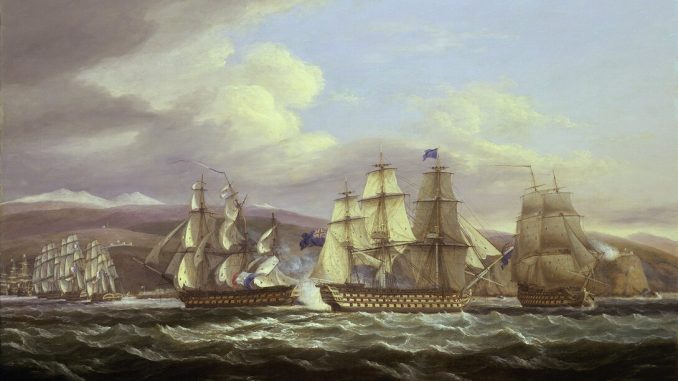By Walter E. Block
 The Blockade of Toulon, 1810-14 (By Thomas Luny – collections.rmg.co.uk, Public Domain)
The Blockade of Toulon, 1810-14 (By Thomas Luny – collections.rmg.co.uk, Public Domain)
During World War II, England and Germany, in addition to bombing each other, also tried to starve out their enemy into submission via blockades. Why did the Germans use submarines at the beginning and all during this war? To reduce the amount of food and medicines that could be transported from the US to the UK. Why did the British, along with its allied partners, blockade Germany? For the very exact same reason: to bring that nation to its knees in the hope it would surrender. While we are on this topic, we can note that the United States imposed a blockade on Japan before this war even started, which undoubtedly was part of the reason for the hostility that arose between these two countries.
Nor need we confine ourselves to this war to point to examples where an army tried to starve out its enemies. Many a castle in medieval days were subjected to a siege by an invading force with this purpose in mind.
Let us now, with the benefit of these historical episodes, look at the situation in the Middle East. Has Israel imposed a blockade on Gaza? If so, it is one of Swiss Cheese. It has holes in it a mile wide. It is very porous. It consists mostly of empty spaces, very little cheese. Israel has had a weapons blockade of Gaza for years. That is more than fully justified based on the rocket attacks on Israel emanating from that quarter; also, on the suicide bombings launched from their myriad of tunnels. The weapons blockade has often been confused with a blockade of humanitarian supplies. The two are totally different.
There were some two million inhabitants of that territory a year ago, and only some 40,000 of them are no longer with us, at least based on the quite possibly inflated death statistics offered by the Gazan Health Ministry, that is, Hamas. Virtually all of these people perished as a result of bombings and shootings, not starvation. This took place in the form of collateral damage (this in turn is solely the fault of Hamas, which uses these poor unfortunates as shields). Also many of the Gazan casualties were due to misfired Hamas and PIJ rockets. Those who remain do not look anything in any way as emaciated as did the Jews who were rescued from Nazi concentration camps, as would be the case if Israel were actually starving the Gazans. Nothing could be further from the truth.
How does the IDF stack up against other armies in the history of warfare in this regard? Quora avers: “The typical civilian-to-combatant death / casualty ratio in war is 9-to-1. Israel has achieved a civilian-to-combatant casualty ratio of 1-to-1, which is incredibly low.”
In the view of Katz, another expert in these matters: “… the combatant-civilian death ratio in Gaza is about 1:1.5 …. In other words, for every combatant killed, around 1.5 civilians are killed. Every loss of civilian life is tragic, but with this ratio, not only should Israel not be accused of genocide (that’s obvious), world leaders should be applauding the IDF’s precision-strike capabilities. As a point of reference, according to the UN, civilians usually make up around 90 percent of casualties in war. That’s a 1:9 ratio (one combatant for every nine civilians).”
According to Jerusalem Center for Public Affairs the sterling record of the IDF has slipped a little bit recently: “Gazan casualties after the 2014 war – only 45% were civilians.” However, with a typical nine to one ratio, no other army comes anywhere near the Israeli record. Genocide, indeed. This crime against humanity consists of purposefully aiming military might at civilians: women, children, babies, old men. Hamas engages in this sort of atrocity regularly; the IDF? Never.
Does Israel have the power to emulate the US, Germany, British blockade policy of the turn of the last century? It is difficult to reject this hypothesis. If the Jewish state wanted to do so, they most likely could have implemented this policy. They desired to do no such thing, and thus this did not occur.
Had the only civilized country in the Middle East emulated the policy engaged in by the combatants in World War II, would the war have ended sooner, with, paradoxically, less loss of life? It is difficult to say. One possibility is that Hamas, seeing the people it is supposed to be protecting undergoing actual starvation, would have surrendered and released their hostages. On the other hand, this terrorist organization has not been exactly overly worried or concerned about the plight of the Gazans, otherwise they would not have launched rockets, missiles, drones, from hospitals, Mosques, schools, residential areas, knowing full well that these placements would provoke Israeli counter-responses.
Had Israel wanted to engage in genocide, it had and still has the power to ensure that not a single solitary Gazan would still be alive.



This statement has the whole story backwards. If the terrorists had any thoughts about the “civilian” population of the Gaza Strip at all, they would be how to place them for the greatest benefit. In other words, where could they be used so that Israel would not fire at anyone while being fired upon? The civilian population is simply a pawn in this mean game because they have everything to lose and nothing to gain. If they refuse to cooperate, they are shot up by their own brothers and then celebrated as martyrs. The only people who starved in Gaza in the last 15 months were the hostages.